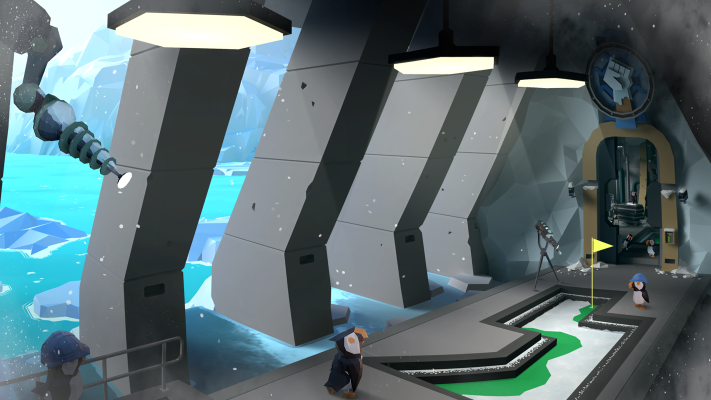
As the gaming industry heads to Game Developers Conference in San Francisco this next week, you can expect to hear and read a lot about the near-distant future of social gaming, spatial computing, and virtual reality. Driven by big activations and algorithms alike, you will get lots of hot takes on this hardware and that software, and how AI is about to change everything again. But I want to tell you what I can say for sure about the value of VR and social gaming right now, not based on our playbook or brand positioning or Mighty Coconut’s ROI strategy for investors, but based on what we hear from Walkabout Mini Golf’s™ players.
We’ve just released the 25th Walkabout Mini Golf course of hand-built, solid mini golf physics and experiential storytelling that hundreds of thousands of intergenerational players in over 40 countries will play together until their VR headsets run out of charge. With a production pipeline modeled on our episodic production expertise, learned over multiple animation and VFX projects, we release new downloadable content (“DLC”) courses every several weeks because that’s what we’ve seen drive player retention and robust community engagement, without the need for heavy marketing.
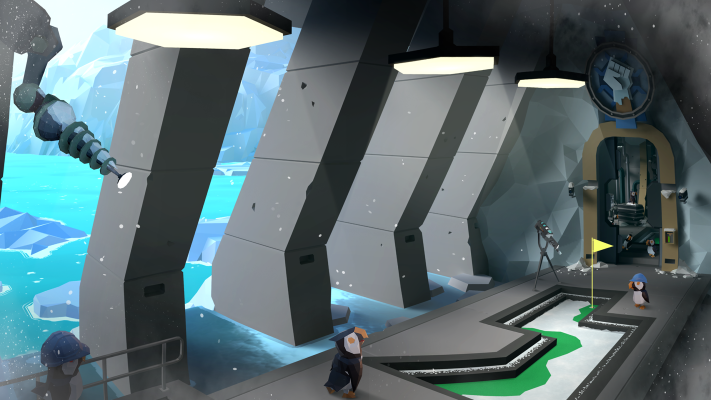
Walkabout Mini Golf: Ice Lair
The Mighty Coconut team feels exceedingly grateful to be in this place and time with Walkabout Mini Golf—with an experience that organically draws nice people together to hang out and compete on their own terms in a good natured way. Our episodic DLC release cadence has worked out well for us. But the course and communications discipline we’ve created is no accident. And it’s also no secret. We’d love to see others take a little from what we’ve learned to help build out a successful VR ecosystem.
We’d like to share a few key lessons based on our observations and analytics for Walkabout Mini Golf play patterns:
-
Making memories together is fun. Walkabout Mini Golf isn’t so much of a game or an app as it is a place. Players of all backgrounds, ages, and skill levels go there to relax and to be together. Parents and their adult children. Spouses. College mates. Coworkers. And groups that have met not in our open lobbies (we don’t have those, for good reason) but through each other and our Discord and Facebook group. The story-infused worlds allow them to share an activity while firing up their imaginations in a way that helps them connect with each other. Players go back again and again because the courses are easy to play, but hard to master.
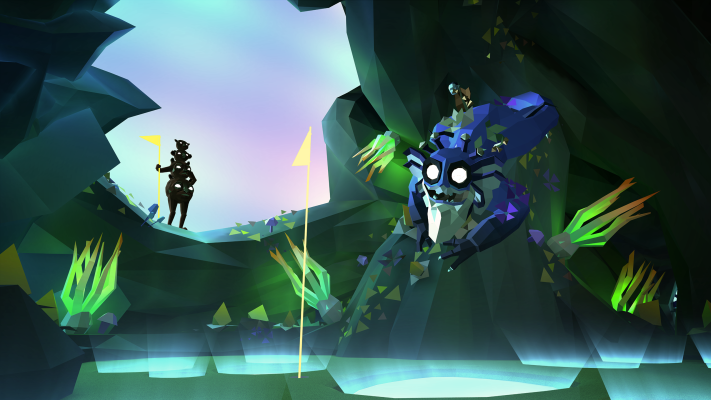
Walkabout Mini Golf: Meow Wolf—a co-creation with the art collective that started here on LinkedIn…
-
Realism doesn’t matter. We have what is called a “low poly aesthetic” or as CNET’s Scott Stein called it – “magical origami” – and that includes our highly customizable avatar system. While the industry is pushing for full bodies and ultra-realistic faces, we chose a more impressionistic style where people can express themselves and their friends can recognize them… and then get on with it. This is especially important because our players want a very, very similar experience across all of our platforms. Indeed, there is a power that comes with a curated environment that is crafted with a focus on charm and appeal. Each design choice is made to bring you into the story and it is peppered with surprises for players to discover together. We hear time and again how much they appreciate these details and approach.
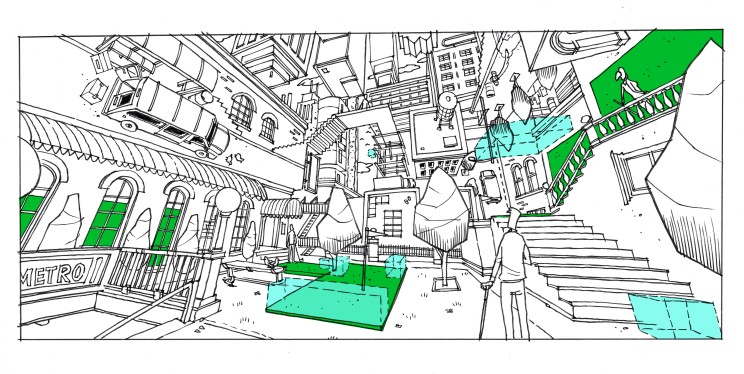
Concept art for Walkabout Mini Golf: Upside Town by our senior art director Don Carson
-
An intentionally positive place. Something that’s so wholesome about our community is that it is truly all types of people—and skewed to non hard-core gamers who are primarily there to connect and have fun, with very little trash talk. Toxicity is not tolerated by us, but more importantly, we’ve structured and modeled things in such a way that our players don’t stand for it either. They tell each other ‘we don’t do that around here’. And that’s key. We also show them what matters by not making the top scorers the rockstars of our game. Instead, we spotlight the couples that meet and fall in love in Walkabout Mini Golf, the brothers who had some of their last times with their father before he unexpectedly passed away, and the sisters who rediscovered laughter and togetherness after one was lost in grief. We encourage decency and kindness, and as a result, our players are very protective of that spirit.
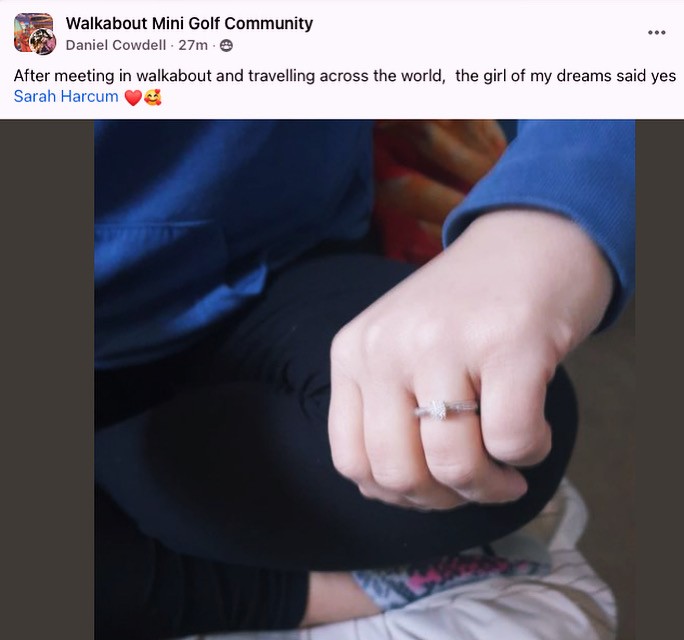
A couple that met in Walkabout Mini Golf from across an ocean, fell in love, and recently got engaged.
-
Players want reasons to come back. By having a dozen courses in production at any moment, and releasing a new course every 6-8 weeks, we’ve made our studio sustainable and taught our players that—even if they don’t follow us on our social channels—there is something new to experience at any time. We meet with our players wherever we go, and listen when they tell us about the deep personal traditions they are building around Walkabout Mini Golf. It matters to them and so it matters to us.
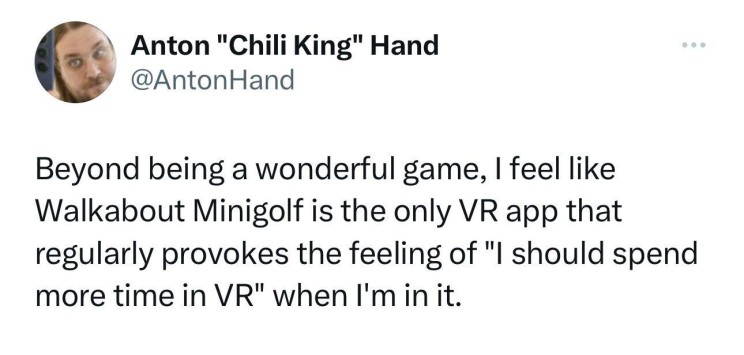
-
It’s meaningful to spend time in a beloved world. Players have been daydreaming about licensed themed courses from day one, and so we approached like-minded studios interested in satisfying their fans’ wish-fulfillment. We began working with brand partners several years ago, starting with courses based on The Jim Henson Company ’s Labyrinth film, Cyan ’s classic video game Myst, Meow Wolf ’s sentient creature Numina, and coming soon with Wallace & Gromit from Aardman . What our community tells us is that they deeply care about spending time in these worlds that are so important to them and they LOVE sharing them with each other. They welcome the opportunity to experience a beloved brand in a new way, much like visiting a theme park, but one not subject to the rules of gravity or realism.

One player upon reading the news about our partnership with Aardman for Walkabout Min Golf: Wallace & Gromit
-
Simplicity is key. Making a video game—especially a virtual reality experience—is highly complicated. But being in one should be very simple… especially if you hope to attract and keep a broad base of players who want to get to the good stuff right out of the box, and each time they return. We always prioritize getting the UI out of the way and just making things apparent. Sometimes, this means that important experiences are not front and center, but rather learned about in more circuitous ways. It’s a delicate balance and one we debate often.
-
Comfort is crucial. Something about VR physiologically and technologically makes it prone for amped up experiences and sensations. A lot of early adopters and hardcore gamers tend towards adrenaline-spiking ideas, almost like hazing users into being worthy of being a part of it. We fundamentally disagree. Everything from the physics to the movement to the community management and multiplayer connection are all about putting people at ease. Our players have told us that playing Walkabout Mini Golf has helped them overcome loneliness, physical maladies, shyness, and much more. We take that role we play in their lives very seriously. Their joy is our joy.
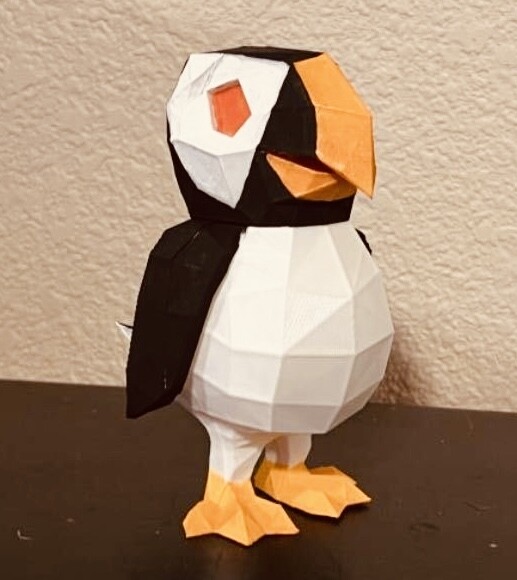
Fan art from a teenage player. It’s 3D model of one of our low poly puffins from Ice Lair
Certainly, there are more lessons to discuss—and I would love to do just that. I also realize that there’s a lot of room out there for all kinds of immersive experiences that work for different people and studios for different reasons. As this industry evolves, we will evolve together, guided by what our highly engaged and supportive players are telling us.
Above all, our team is just so humbled to be able to do this work and to have it so well received by so many. We’re committed to keeping it up and growing the ways Walkabout Mini Golf can be a place for being together. You, like everyone else, are invited to get in on the fun.






